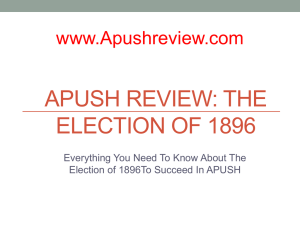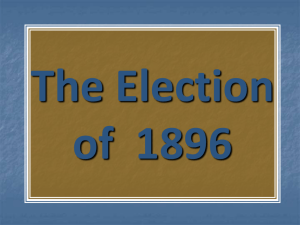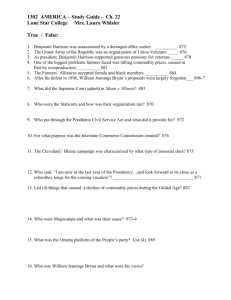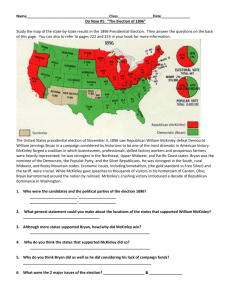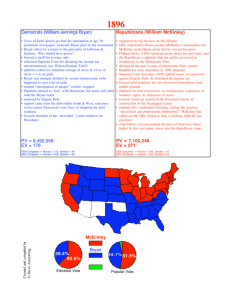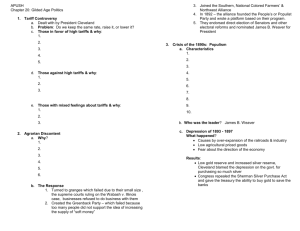William McKinley
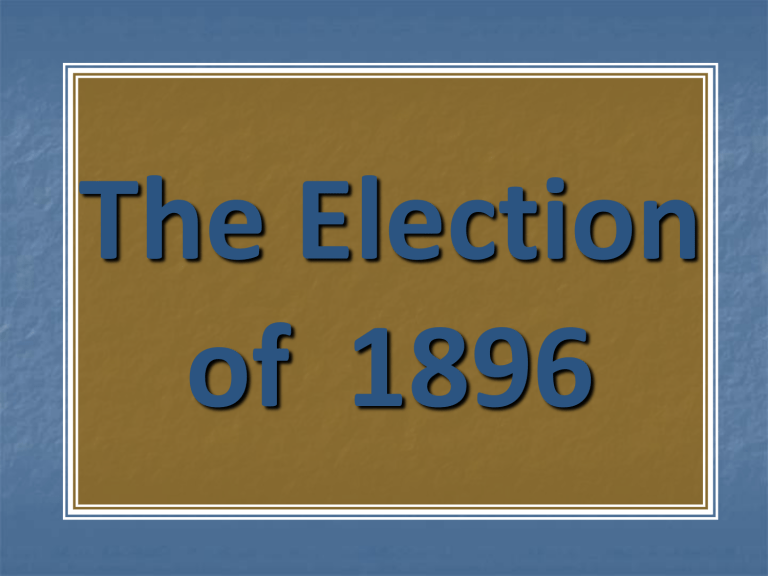
The Election of 1896
DEMOCRATS
1. President Cleveland was in office: a. Was successful in having the Sherman Silver
Purchase Act repealed in 1893 b. Democratic party becomes split on free silver issue. c.
Cleveland fails to be re-nominated
. d. Silver is a central issue in the election of
1896.
2. So the Democrats nominate
William Jennings Bryan a. Congressman from Nebraska b. He gives the “Cross of
Gold” s peech- in support of silverbacked currency c. Populists join with
Democrats and hope for victory. This ended the 3rd party in 1896.
REPUBLICANS
A.
B.
William McKinley
(Rep. Nom)
Platform: Would maintain gold standard and end depression
President William McKinley
Republican
1897-1901
Garret A. Hobart
(1897-1899),
none (1899-1901),
Theodore Roosevelt
(1901)
Political Aspects
(1) The Election of 1896…
Republican Candidate: William
McKinley
Democratic Candidate: William
Jennings Bryan
Issues: Tariff; Gold or Silver
Standard
McKinley and Bryan
(1 cont) McKinley won by the largest majority of popular votes since 1872!
Electoral Map of 1896
( Teal = Bryan, Green = McKinley)
Notice the # of states that vote for
Bryan…yet he still lost! Why?
Economic Aspects
When McKinley became President, the depression of
1893 had just about died out, as well as the big fuss over silver.
Dingley Tariff Act, 1897 –Redeemed the Republican promises to restore the high protective tariff and provided for an average rate of 49%
(12) Gold Standard Act, 1900 – under its terms, the
U nited S tates formally placed its money on the gold standard. All currency was fully backed by gold. Its price was fixed at $20.67 an ounce.
Social Aspects
A minority faction of
Republicans supported national prohibition, as did some Populists (mostly in
the West rather than the
South). Since 1869, the strongest supporters of
anti-liquor had banded together in the
Prohibition Party.
Temperance -
Restraint in the use of or abstinence from alcoholic liquors
Women’s Christian
Temperance Union
(WCTU) – founded in
1874, but became very popular in the 1890s
Race Relations:
He appointed 30 African Americans to "positions of consequence" (mainly jobs in diplomatic and records offices), much less than what black
Repubs. had wanted.
During the Spanish-American War, he overruled orders preventing the recruitment and service of black soldiers.
This did not do much to halt the continued mistreatment of blacks in American society.
(2) The
Grandfather
Clause was passed in 1898 in Louisiana
And soon 7 other states by 1910, the Grandfather Clause stated that all men or lineal descendants of men who were voters before 1867 did not have to meet the educational, property, or tax requirements for voting then in existence. This effectively allowed all white males to vote while denying the franchise to black men and other men of color.
The Grandfather Clause, with its voting denial, became the centerpiece of a much larger system of discrimination and racial segregation.
(11) Election of 1900- same candidates…
Republican Candidate: William McKinley
Republican VP Candidate: Theodore
Roosevelt
Democratic Candidate: William Jennings
Bryan
Issues : Currency issue dead! Focus turns to imperialistic views due to the Spanish-
American War of 1898
Electoral Map of 1900
( Blue = Bryan, Green = McKinley)
McKinley defeated Bryan by even larger margins!
(13)
Assassination of McKinley
September 6, 1901, in
Buffalo, NY
28-year-old Leon
Czolgosz, an anarchist , had fired a hidden revolver into the
President’s chest.
Czolgosz claimed to have shot the president because he was the "enemy of the people, the good working people." The assassin expressed no remorse for his actions and died in the electric chair on October 29, 1901.
First Lady Ida Saxton McKinley lost two infant daughters as well as her mother within three years of her marriage to McKinley. She then developed epilepsy and became
an invalid.
McKinley gave her his full attention, breaking White
House protocol in seating her by his side at State dinners. When shot by an assassin in 1901, McKinley said to his secretary, "My wife, be careful… how you tell her -- oh, be careful."
